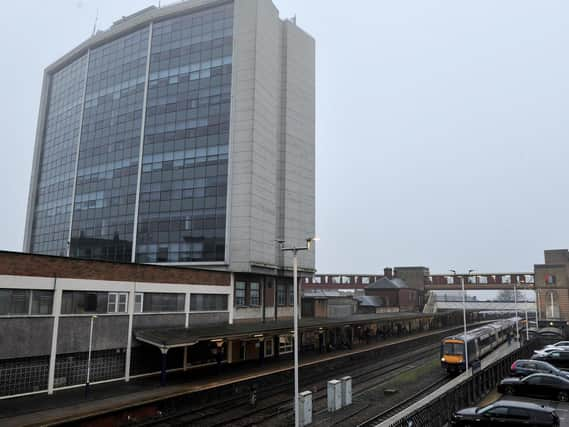Government subsidies keeping Harrogate rail passengers on track during pandemic but worries grow over financies


Yorkshire's two main rail operators will have received more than £1bn in subsidies from the Government in the year since the start of the pandemic - despite carrying only a third of their usual passengers.
Advertisement
Hide AdAdvertisement
Hide AdA new report says the financial impact of the pandemic - which saw demand fall to just five per cent of its normal levels at its lowest point - could put the sustainability of rail services at risk in future.
And northern leaders have been told that plans to regain customers are now "essential" for train companies in order to generate the revenue to keep services going.
Transport bosses hope to tempt passengers back with promotions on cheaper journeys and more flexible train tickets while also potentially targeting motorists in the hope of persuading them to ditch their cars.
With passenger numbers plummeting during the first national lockdown and only partially recovering, meaning a huge fall in revenue for operators like Northern and TransPennine Express, the existing franchising system was suspended in March.
Advertisement
Hide AdAdvertisement
Hide AdSince then the Government's Emergency Measures Agreements mean all the money from fares goes to the Government, which also takes on the financial risk of running the network to save firms from going under as a result of the slump in demand.
A report by Transport for the North reveals that in the first six months, the Government made net payments of £561m to Northern and TransPennine, £200m more than the subsidy for the entire 2018/19 financial year.
The report said: "If the position is replicated for the second half of 2020/21, the net subsidy cost could be over £1bn – to carry around a third of the usual passengers. This is a position replicated across the country."
In the short term the third national lockdown means the number of journeys by rail has fallen again, though not as much as in March and April.
Advertisement
Hide AdAdvertisement
Hide AdAnd the TfN report, discussed a meeting of its Rail North Committee, said adjustments would be needed to timetables to "ensure the right balance between demand levels, connectivity levels and cost to the taxpayer is struck"
.
Rob Warnes of Northern, which in January was taken into public hands by Grant Shapps, said a new reduced timetable would come into force because of staff shortages due to the pandemic.
The timetable which comes into force on January 18 will run for four weeks and will be similar to the levels of service seen in July. After that Northern is ready to put on more services should lockdown restrictions be lifted.
And the TfN report said that looking further ahead, to "ensure sustainability (and reduce the taxpayer call) in the medium term it is essential that there is a clear strategy to regain passengers".
Advertisement
Hide AdAdvertisement
Hide AdIt added: "This is particularly the case as industry analysis shows that some markets (such as commuter traffic where changes to home vs office working arrangements will be long lasting) will permanently change and therefore will have different requirements in terms of service levels and ticketing products etc.
"In order to ensure the ongoing sustainability of rail in the North it is essential that there is continued investment in services and infrastructure to support the re-building of the passenger market."
TfN's 'roadmap to recovery' plan sets out how measures will be required to improve passenger confidence after the pandemic, with communications about how services are 'good to go' and targeted promotions and campaigns.
Ticketing reforms will also help entice passengers back, officials believe, such as 'flexi' season tickets for people travelling fewer than five days a week and piloting the use of 'pay as you go' travel using bank cards.
Advertisement
Hide AdAdvertisement
Hide AdIt is also hoped that rail operators can target motorists and encourage them to travel by rail by highlighting how much spare capacity train services have at busy times of day compared to the roads.
Liam Robinson, a Liverpool councillor who chairs the Rail North committee, said: "We can't 'build back better' [after the pandemic] with a car led recovery, we have to have one that gives us a strong rail network, environmentally and economically into the future."
A message from the Editor
Thank you for reading this story on our website. While I have your attention, I also have an important request to make of you.
Advertisement
Hide AdAdvertisement
Hide AdIn order for us to continue to provide high quality and trusted local news on this free-to-read site, I am asking you to also please purchase a copy of our newspaper.
Our journalists are highly trained and our content is independently regulated by IPSO to some of the most rigorous standards in the world. But being your eyes and ears comes at a price. So we need your support more than ever to buy our newspapers during this crisis.
With the coronavirus lockdown having a major impact on many of our local valued advertisers - and consequently the advertising that we receive - we are more reliant than ever on you helping us to provide you with news and information by buying a copy of our newspaper.